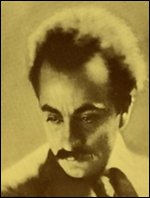 Someone somewhere once said: "Perfectionists achieve great things in life. But it is the people close to them who suffer." Rest Upon the Wind, a play inspired by the life and times of Khalil Gibran, shows us that this great visionary was no different.
Someone somewhere once said: "Perfectionists achieve great things in life. But it is the people close to them who suffer." Rest Upon the Wind, a play inspired by the life and times of Khalil Gibran, shows us that this great visionary was no different.
One of the world's best-selling poets and the author of The Prophet, a book, according to the BBC, that still "stands alongside the Bible as one of the best-selling books of all times", Khalil Gibran remains a giant in the world of literature.
A man who mixed with the intellectual elite of his time from WB Yeats to Carl Jung to August Rodin, a man whose words inspired The Beatles, John F Kennedy and Indira Gandhi, Gibran has been called a sage and a seer. We hear his verses at weddings, graduations and funerals, his exquisite language having inspired so many of us over the years, his quotes having lit our paths, time and time again, in times of darkness. Yes, there is definitely something in his poetry that nourishes our souls.
But Rest Upon the Wind, the theatrical production that played to packed houses during a recent run in Dubai and is now on its way to Abu Dhabi for one performance on Monday night at Emirates Palace, invites us to take a closer look at his personal life and ask, just how spiritually-nourishing was his presence to those closest to him?
Gibran once wrote: "It is well to give when asked, but better to give unasked, through understanding". These are poignant words and yet we learn through his sister Miryana, throughout the play, that Gibran, himself, was not much of a giver.
In one especially powerful scene, she accuses him of being selfish and emotionally unavailable. A family of Poor Lebanese Christian immigrants in the US, she describes how she toiled day and night to earn money as a seamstress while he played the tormented genius. She explains how she nursed their dying mother, brother and sister single-handedly while he hobnobbed with intellectuals, not even returning for their funerals. She cries because she dreams of a life of her own, but is instead reduced to the role of his caregiver.
We learn about the role of Mary Haskell, a wealthy, older woman who supported him, emotionally and financially, in his intellectual pursuits. She was much more than a mentor, although they never married. Less known, however, is the character of Micheline, a French teacher and a journalist who posed for one of his paintings.
When it comes to Khalil Gibran's dysfunctional relationships with those closest to him, it is difficult not to compare him to other "great" men who have faced similar challenges. We have all heard of August Rodin, the French sculptor who soared to fame because of his innovative ways of depicting the human form. What is lesser known, however, is the role of a young female sculptor and romantic interest called Camille Claudel, who not only posed for him, but actually made many of the sculptures he took credit for. As his fame rose, he left her for another woman. We see her devastation in the French film Camille Claudel, in which she is then admitted to a mental asylum where she eventually dies.
Similarly, we all know and respect Mahatma Gandhi, the great Indian leader who transformed the soul of a nation. What is less known, however, is his troubled relationship with his eldest son, Harilal. Through the Indian film Gandhi Was My Father, we learn about a man who freed a nation but was less than kind to his own son. Crumbling under the shadow of a father who was harsh, rigid and critical with his own son while purporting to be the father of independent India, Harilal eventually succumbed to the effects of alcoholism.
Without a doubt, Gandhi Was My Father, Camille Claudel and Rest Upon the Wind all belong to a genre of art that is unsettling for many because of its candour. But it is important to remember that showing historical figures as being human does not diminish their work or their good deeds. Instead, it helps us empathise with the challenges they once faced.
After all, the object of good art is to make us think. And - if we are lucky - maybe even to help us to realise something about our own selves.
thenational.ae